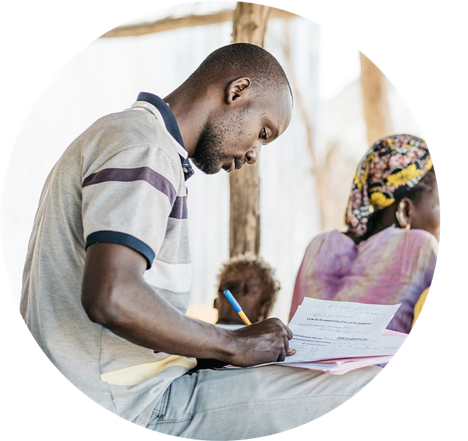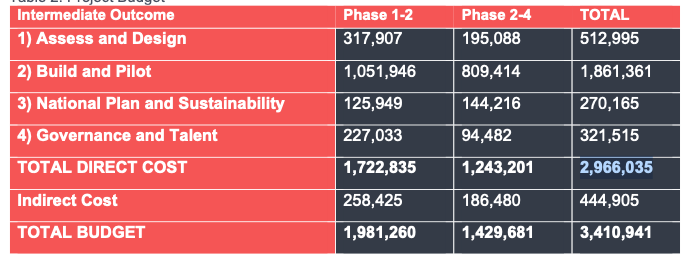Zambia Digital Community Health Project (ZDCHP)¶
Phase Two to Phase Four Implementation
- Table of contents
- Zambia Digital Community Health Project (ZDCHP)
- 1. Introduction
- 2. Background
- 3. ProjectStrategy
- 4. Current Status
- 5. BudgetOverview
- 6. Stakeholder Engagement
- 7. Conclusion

1. Introduction¶
The Zambia Digital Community Health Project (ZDCHP) is a three-year initiative funded by a $3.4 million grant from the Bill and Melinda Gates Foundation. The project aims to support the growth and modernization of Zambia's community health system. Launched in November 2021, the project has four intermediate outcomes:
• Architecture/design defined for digital community health system.
• Evidence generation through pilots.
• Robust scaling/national rollout plan that all stakeholders are aligned on and that locks in future funding sources for sustainability.
• Talent plan for increased capacity at the Ministry of Health (MoH), supported with non- governmental partners to coordinate digital community health implementation.
Once achieved, these outcomes will produce a functional, user-oriented CHiP with prioritized disease condition data collection modules that the MoH leads, pilots and begins to scale with funding from multiple sources, and will ultimately contribute to lowering the burden of disease through increased coverage and quality of care.
2. Background¶
Zambia has a long history of community health workers (CHWs) playing a vital role in delivering primary health care. However, the CHW workforce is under-resourced and lacks access to essential tools and information. This has led to disparities in health outcomes, with those living in rural areas and marginalized communities often being the most affected.
The ZDCHP aims to address these challenges by developing a digital community health system that will provide CHWs with the tools and information they need to deliver high-quality care. The system will be designed to be interoperable with other digital health platforms in Zambia, ensuring that data is shared and used effectively to improve health outcomes.
3. ProjectStrategy¶
The ZDCHP uses a phased approach to achieve its goals and objectives. The first phase of the project focused on defining the architecture and design of the digital community health system. This involved conducting a series of consultations with CHWs, health care providers, Ministry of Health programmatic staff and other stakeholders to understand their needs and priorities with regard to community health services.
The second to fourth phase of the project will focus on generating evidence on the effectiveness of the digital community health system through pilots in selected districts. The pilots will test the system's functionality and usability and collect data on its impact on health outcomes.
4. Current Status¶
The ZDCHP has now entered the second and third phase of implementation. In the second and third phase, the ZDCHP is working with various sub partners, as summarized below, to develop and deploy the Community Health Information Platform in selected facilities across Katete, Ndola, Mpongwe, Kazungula and Lusaka Districts.
-
ArguSoft: They will develop the main digital community health platform as well as a supplementary optical character recognition solution. This solution will be integrated with the HMIS and other key digital health solutions.
-
QED: They will develop an optical character recognition solution aimed at helping to assess where an OCR is a more sustainable solution.
-
Digital Treasure: They are a local digital firm who will support implementation of the above solutions and capacity building with MoH.
-
Busara: They will independently monitor and evaluate the implementation of the Community Health Information Platform. Please see attached proposal. We will be happy to receive your feedback on what additional questions you would like Busara to answer in the evaluation. Busara will be supported by a local monitoring and evaluation firm whose contracting should be completed before the end of the month. Busara will be supported by a local monitoring and firm.
-
D-Tree: They will develop a five-year implementation and sustainability plan for the Community Health Information Platform. The implementation and sustainability plan will serve as a resource mobilization strategy as well as a high-level guide for implementing the CHIP beyond the initial facilities.
A number of activities have been planned to achieve the goal of developing CHIP
5. BudgetOverview¶
The total budget for the ZDCHP is $3.4 million. The funding will be used to cover the costs of developing the digital community health system, conducting pilots, and scaling the system to national level. The breakdown of the budget linked to the project’s outcomes is as follows:
Table 2: Project Budget

The ZDCHP is actively engaging other funders such as the Swedish Government and US President’s Malaria Initiative Zambia and Washington offices to explore potential additional funding and leverage of existing resources, for example prepurposing of devices from the bed net distribution campaign. Any additional resources garnered beyond the ZDCHP funding will go towards further scale of the CHIP either implemented by PATH or any other organization that may take interest in this work.
6. Stakeholder Engagement¶
The project concept was initially designed with inputs from the Bill and Melinda Gates Foundation, PATH, Ministry of Health and US President’s Malaria Initiative. Once funding was secured wider stakeholder engagement has been with various stakeholders, including Jhpiego, IHM, D-Tree, On Call Africa, Evidence for Health, Tony Blair Institute, John Snow Inc, AMREF, Churches Health Association of Zambia, USAID, CDC, Smart Zambia Initiative, MOH at national, provincial, district, facility and community level in defining and validating the functional and non-functional requirements of the CHIP. The MoH Community Health Unit, Monitoring and Evaluation Department and Information and Communication Technology Department played a critical role in providing guidance on the type of solution that would meet the requirements. The ZDCHP will continue to engage stakeholders to keep them informed of progress and get their input on key issues and decisions as needed.
7. Conclusion¶
The ZDCH Project has enjoyed the support and guidance of the MoH since inception and will continue to rely on the MoH to collaborate on key project activities and decisions. The community health digital tool is positioned to make a critical contribution to the MoH vision of improving health outcomes for all Zambians through sustainable, secure, and innovative digital health interventions that are interoperable and to contribute to the decentralization agenda. Ultimately, these efforts will play a part improving health services and health outcomes in Zambia.
Updated by Redmine Admin almost 2 years ago · 8 revisions
Like0 Go to top